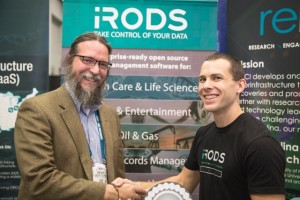iRODS Consortium welcomes NICS at University of Tennessee as newest member at SC15
Consortium membership doubles since last Supercomputing Conference
AUSTIN, Texas, Nov. 18, 2015 - The National Institute of Computational Sciences (NICS) at the University of Tennessee today became the 13^th^ member of the iRODS Consortium, the membership-based foundation organized to sustain the integrated Rule-Oriented Data System (iRODS) as free open source data management software.
The newest consortium member was announced in the RENCI booth (#181) on the SC15 show floor at the Austin Convention Center.
[caption id="attachment_3083" align="alignright" width="300"] Dan Bedard, right, welcomes Gregory Peterson, director of the National
Institute of Computational Sciences, to the iRODS Consortium in the
RENCI booth at SC15[/caption]
Dan Bedard, right, welcomes Gregory Peterson, director of the National
Institute of Computational Sciences, to the iRODS Consortium in the
RENCI booth at SC15[/caption]
NICS, a National Science Foundation-funded high-performance computing center that provides computational resources for more than 1,000 users, is the seventh new iRODS Consortium member this year. Other members are the Wellcome Sanger Institute, Cleversafe, DataDirect Networks (DDN), EMC Corporation, IBM, NASA’s Atmospheric Science Data Center, Novartis, Seagate, RENCI, University College London, Complete Genomics, and the Data Intensive Cyber Environments (DICE) group at UNC-Chapel Hill.
“The importance of managing data is central to scientific research today,” said Gregory Peterson, director of NICS. “Using iRODS and being a member of the consortium will help us better serve our users, who have massive amounts of data to manage. That’s why we exist—to help users do their science and make discoveries.”
Thousands of businesses, research centers, and government agencies worldwide use iRODS for flexible, policy-based data management that provides long-term preservation and federation. Organizations in the U.S., Europe, Asia, South America, and Africa use iRODS to manage data used in genomics (e.g. the U.K’s £9 million eMedLab collaboration), climate research (e.g., NOAA’s National Climatic Data Center and NASA’s Center for Climate Simulation); and seismology (e.g., the Southern California Earthquake Center). National and regional-scale libraries, such as the French National Library and the Texas Digital Libraries, also use iRODS to control their data.
“NICS serves a wide range of scientific users, and the iRODS team looks forward to helping these world-class researchers control their data,” said Dan Bedard, executive director of the iRODS Consortium. “As consortium members, they will contribute greatly to the continuing development of iRODS and we will learn much from the diverse community they serve.”
The iRODS development team, based at the University of North Carolina’s Renaissance Computing Institute (RENCI) will present iRODS demonstrations at the RENCI SC15 booth (#181) throughout the remainder of the conference. Other demonstrations using iRODS demonstrations will also be presented in the EMC booth (#499) on Wednesday at 2:30 p.m. and at the DDN booth (#633) on Thursday at 12:30 p.m.
About the iRODS Consortium
The iRODS Consortium is a membership organization that supports the development of the Integrated Rule-Oriented Data System (iRODS), free open source software for data discovery, workflow automation, secure collaboration, and data virtualization. The iRODS Consortium provides a production-ready iRODS distribution and iRODS training, professional integration services, and support. The world's top researchers in life sciences, geosciences, and information management use iRODS to control their data. Learn more at irods.org.
The iRODS Consortium is administered by founding member RENCI, a research institute for applications of cyberinfrastructure at the University of North Carolina at Chapel Hill. For more information about RENCI, please visit www.renci.org.
Terrell Russell